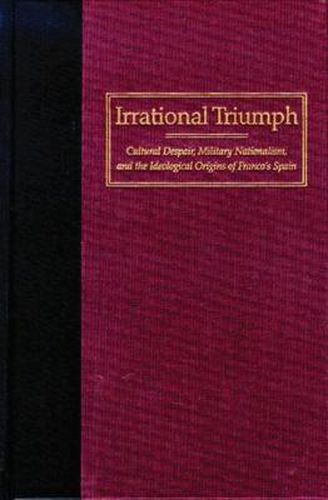Readings Newsletter
Become a Readings Member to make your shopping experience even easier.
Sign in or sign up for free!
You’re not far away from qualifying for FREE standard shipping within Australia
You’ve qualified for FREE standard shipping within Australia
The cart is loading…






A nationalist vision, strongly rooted in Spanish Catholicism and military culture, was one of the most powerful ideological tools of the Franco regime until its demise in 1975. Although nationalist movements in Spain’s Basque and Catalan provinces have been closely studied, hitherto little attention has been given to the origins and evolution of nationalism in Spain itself. In this study, historian Geoffrey Jensen examines the complex and richly diverse origins of Francoist nationalism. In the years following defeat in the Spanish-American War, Spain’s leading intellectual figures struggled to explain the reasons for their country’s decline and to argue over possible means to regenerate the nation. Among these figures were members of Spain’s Restoration officer corps, men whose views reflected a surprisingly wide range of ideas and political positions, who participated in the new intellectual movements that attracted much attention elsewhere in Europe, and whose values ranged from extreme conservatism to Nietzschean modernism. The diversity of this military culture, as Jensen demonstrates, gradually narrowed as events in early 20th-century Spain seemed to encourage ever more radical solutions to the social, political and economic unrest of the period. Jensen’s pathbreaking analysis of Spain’s military culture during the years between 1898 and the establishment of Primo de Rivera’s dictatorship in 1923 marks a major contribution to our understanding of subsequent Spanish history. Focusing on the intellectual world of Spain’s military elite - its education, values and the writings of some of its leading intellectual figures -
Irrational Triumph
reveals the evolution of a military culture that ultimately became a principal bulwark for Franco’s fascist regime and whose monolithic nationalist vision shaped the fate of Spain and the country’s non-Castilian minorities for the rest of the century.
$9.00 standard shipping within Australia
FREE standard shipping within Australia for orders over $100.00
Express & International shipping calculated at checkout
A nationalist vision, strongly rooted in Spanish Catholicism and military culture, was one of the most powerful ideological tools of the Franco regime until its demise in 1975. Although nationalist movements in Spain’s Basque and Catalan provinces have been closely studied, hitherto little attention has been given to the origins and evolution of nationalism in Spain itself. In this study, historian Geoffrey Jensen examines the complex and richly diverse origins of Francoist nationalism. In the years following defeat in the Spanish-American War, Spain’s leading intellectual figures struggled to explain the reasons for their country’s decline and to argue over possible means to regenerate the nation. Among these figures were members of Spain’s Restoration officer corps, men whose views reflected a surprisingly wide range of ideas and political positions, who participated in the new intellectual movements that attracted much attention elsewhere in Europe, and whose values ranged from extreme conservatism to Nietzschean modernism. The diversity of this military culture, as Jensen demonstrates, gradually narrowed as events in early 20th-century Spain seemed to encourage ever more radical solutions to the social, political and economic unrest of the period. Jensen’s pathbreaking analysis of Spain’s military culture during the years between 1898 and the establishment of Primo de Rivera’s dictatorship in 1923 marks a major contribution to our understanding of subsequent Spanish history. Focusing on the intellectual world of Spain’s military elite - its education, values and the writings of some of its leading intellectual figures -
Irrational Triumph
reveals the evolution of a military culture that ultimately became a principal bulwark for Franco’s fascist regime and whose monolithic nationalist vision shaped the fate of Spain and the country’s non-Castilian minorities for the rest of the century.